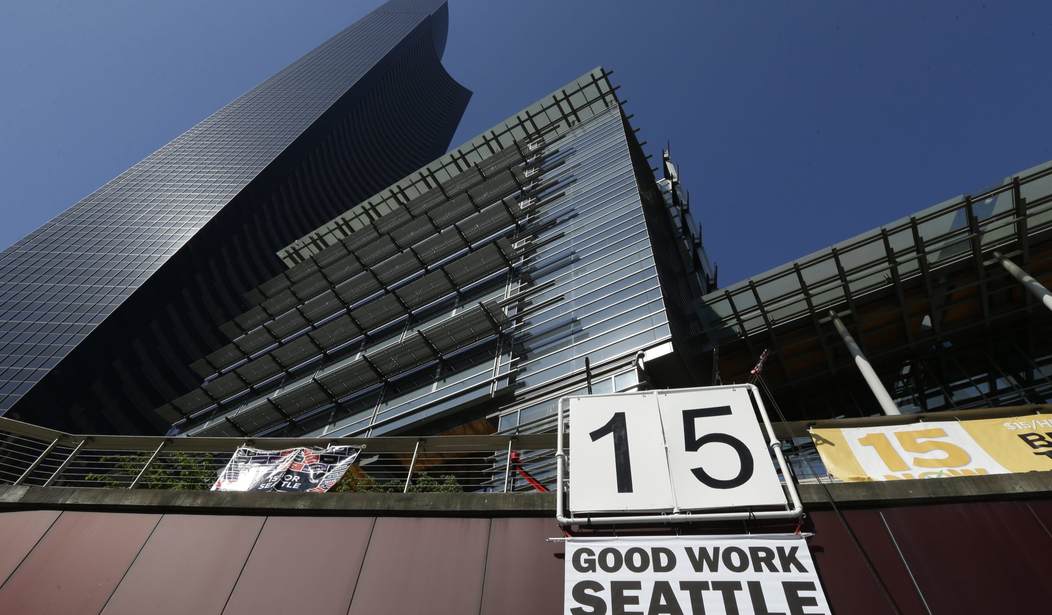It’s common sense. If you raise the minimum wage, companies that rely on minimum wage labor need to either cut hours or fire employees, and prices may have to rise to offset the increased expense. After all, most businesses run on thin enough margins as it is.
The Left denied this would happen, however. Reality has no place in policy discussions, it seems.
After Seattle raised its minimum wage to $15 per hour — the magic number that liberals settled on — it commissioned the University of Washington to study the effects of the increase.
Early indicators were that the increase was a disaster, but what was the official verdict? Well, as the liberal Slate reports:
Here’s how the study worked: To determine how the policy had affected Seattle’s labor market, the authors created a “synthetic” version of the city to use as a comparison — essentially, a mathematical mash-up of other cities and suburbs in Washington that, once stitched together, closely tracked the actual Seattle economy before the ordinance went into effect, and could therefore depict an alternate reality where Seattle’s pay floor didn’t rise.
Based on this counterfactual, they found that the law had reduced the total number of hours worked by low-wage employees by 9.6 percent. The total number of jobs paying less than $19 an hour — their threshold for “low-wage” — fell by 6.8 percent, compared with the counterfactual. Obviously, many workers received raises as a result of the new minimum. But thanks to all those shortened shifts and lost cashier gigs, the average low-wage worker ended up taking home $125 less each month. Which, for those workers, is quite a lot.
This is pretty much the worst-case scenario for a minimum wage policy. Many people find the idea of losing a few jobs acceptable as long as low-wage workers make more money overall. But raising wages to the point where they force businesses to cut back so significantly that low-pay employees make less as a group is almost certainly not an outcome anyone wants.
Beyond its worrisome headline findings, the study also suggests that previous researchers may have missed the minimum wage’s job-killing effects in industries like fast food because they simply didn’t have detailed enough data. When the team looked at total employment in Seattle restaurants, it found the rising minimum wage had no apparent effect. But on closer inspection, they found a more complicated situation. Low-wage jobs did decline, but employers added higher-paid positions. This, they argued, suggested that low-skill workers were being nudged out of the job market in a way that the previous literature wouldn’t have detected.
The result is frightening for at least one other reason: Seattle’s minimum wage hadn’t even hit $15 during the period the researchers studied. By the end of 2016, it had maxed out at $13 for some large employers and $12 for smaller employers. And yet the ill effects were already kicking in.
It seems that progressives aren’t ready to accept that reality based on the very next paragraph:
The Economic Policy Institute’s Ben Zipperer has pointed out that, taken at face value, the Washington team’s results suggest that the new minimum wage actually caused an increase in the number of jobs paying $19 an hour in the restaurant industry as well as a rise in the number of hours worked by those sorts of high-wage employees in all sectors. This is a bit puzzling, since the Washington team’s paper is premised on the idea that Seattle’s minimum wage shouldn’t affect jobs that pay more than $19 an hour.
I’m going to point something out for anyone stupid enough to actually believe the bolded section: People who are going to be paid $19 per hour are not untrained fast food workers. Those jobs are going to go to known entities, people whom employers know are capable and require minimal supervision. This is not going to help the vast majority of fast food or restaurant workers. They’re going to be the ones filing for unemployment or public assistance.
The truth is that the University of Washington study has provided us with all the information we should need to see that such a drastic wage hike would be economic suicide. However, liberalism is really just a suicide pact, so it shouldn’t be surprising that they’ll ignore the data.









Join the conversation as a VIP Member